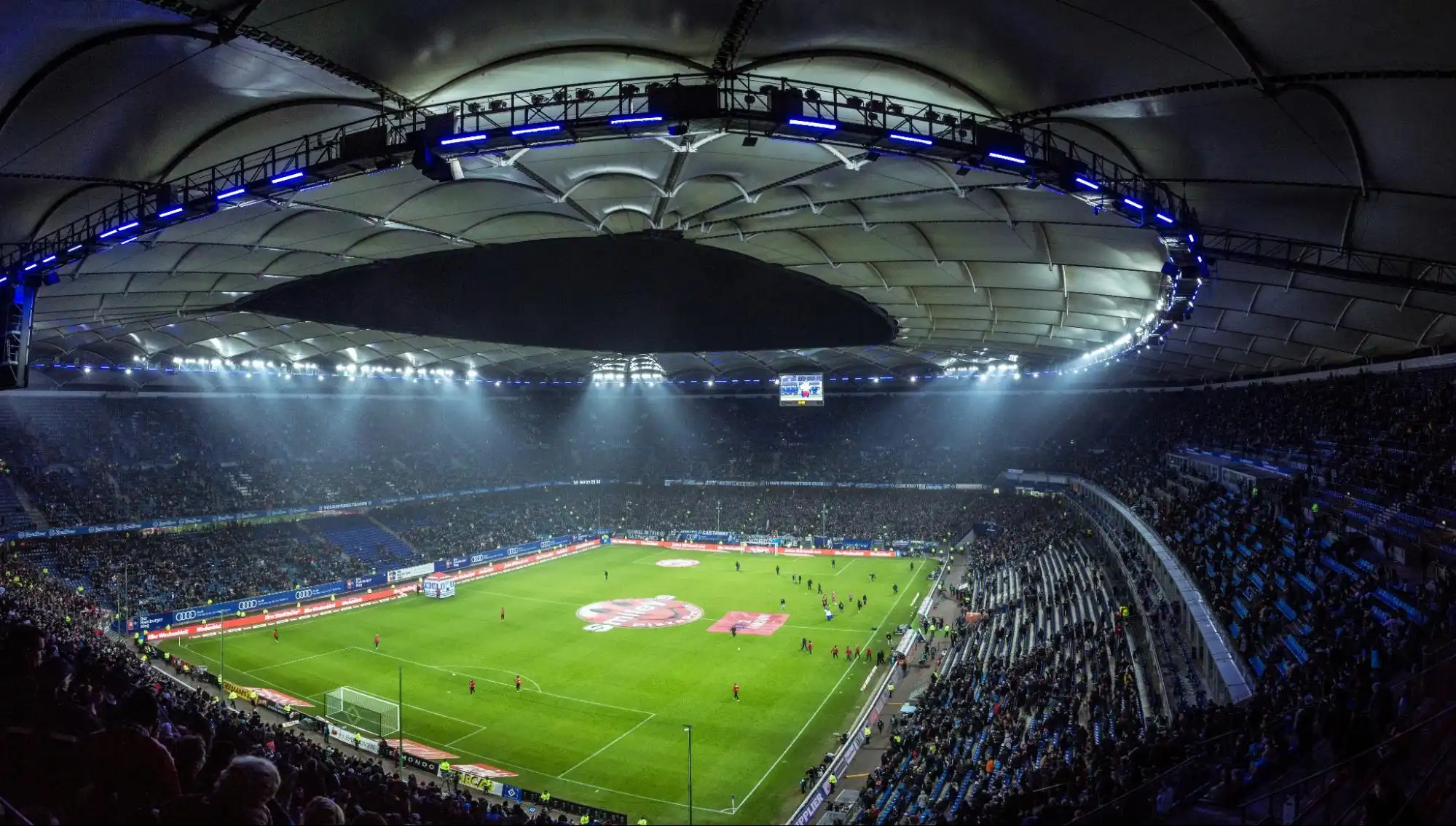
What is the Best Stadium at Euro 2024?
Written by Liran Froind
Welcome to our definitive ranking for the best stadium at Euro 2024. A few transport and infrastructure problems aside, there are no losers in this contest, because all of the Euro 2024 venues are impressive.
One reason for this high quality is a spell of construction and redevelopment that took place before the World Cup in 2006, bringing German football venues into the 21st century. This could be the finest collection of stadiums in Europe.
Still, what we’re trying to do is determine the cream of the crop. This is no easy feat, so we’re going to rank each stadium by a few different factors:
- Capacity
- Beauty
- Fan Experience
- Sporting History
- Host City
Which Euro 2024 Stadium Has the Highest Capacity?
When it comes to an amazing shared experience like a European Championships, the more, the merrier. More fans should mean a bigger atmosphere and a bigger spectacle.
So let’s rank the Euro 2024 stadiums by capacity, and introduce each venue. It should be noted that all of these grounds have a reduced capacity for the tournament due to standing sections being prohibited in international football.
| Rank | Stadium | Club Team | Biggest Euro 2024 Game | Capacity |
| 1 | Olympiastadion, Berlin | Hertha BSC | Euro 2024 Final | 70,000 |
| 2 | Munich Football Arena | FC Bayern Munich | Euro 2024 Semi-Final | 66,000 |
| 3 | Signal Iduna Park, Dortmund | Borussia Dortmund | Euro 2024 Semi-Final | 62,000 |
| 4 | MHPArena, Stuttgart | VfB Stuttgart | Euro 2024 Quarter-Final | 54,812 |
| 5 | Veltins-Arena, Gelsenkirchen | FC Schalke 04 | Euro 2024 Round of 16 | 50,000 |
| 6 | Volksparkstadion, Hamburg | Hamburger SV | Euro 2024 Quarter-Final | 49,000 |
| 7 | Deutsche Bank Park, Frankfurt | Eintracht Frankfurt | Euro 2024 Round of 16 | 47,000 |
| 8 | Merkur Spiel-Arena, Düsseldorf | Fortuna Düsseldorf | Quarter-Final | 47,000 |
| 9 | RheinEnergieStadion, Cologne | 1.FC Köln | Euro 2024 Round of 16 | 43,000 |
| 10 | Red Bull Arena, Leipzig | RB Leipzig | Euro 2024 Round of 16 | 40,000 |
Which is the Most Beautiful Stadium at Euro 2024?
This is surely the most subjective category of all, but we’ll try and rank the ten Euro 2024 stadiums by appearance as fairly as possible. Again, the standard is extremely high, but there is an old-fashioned whiff of the 2000s about a couple of these venues.
1. Signal Iduna Park, Dortmund
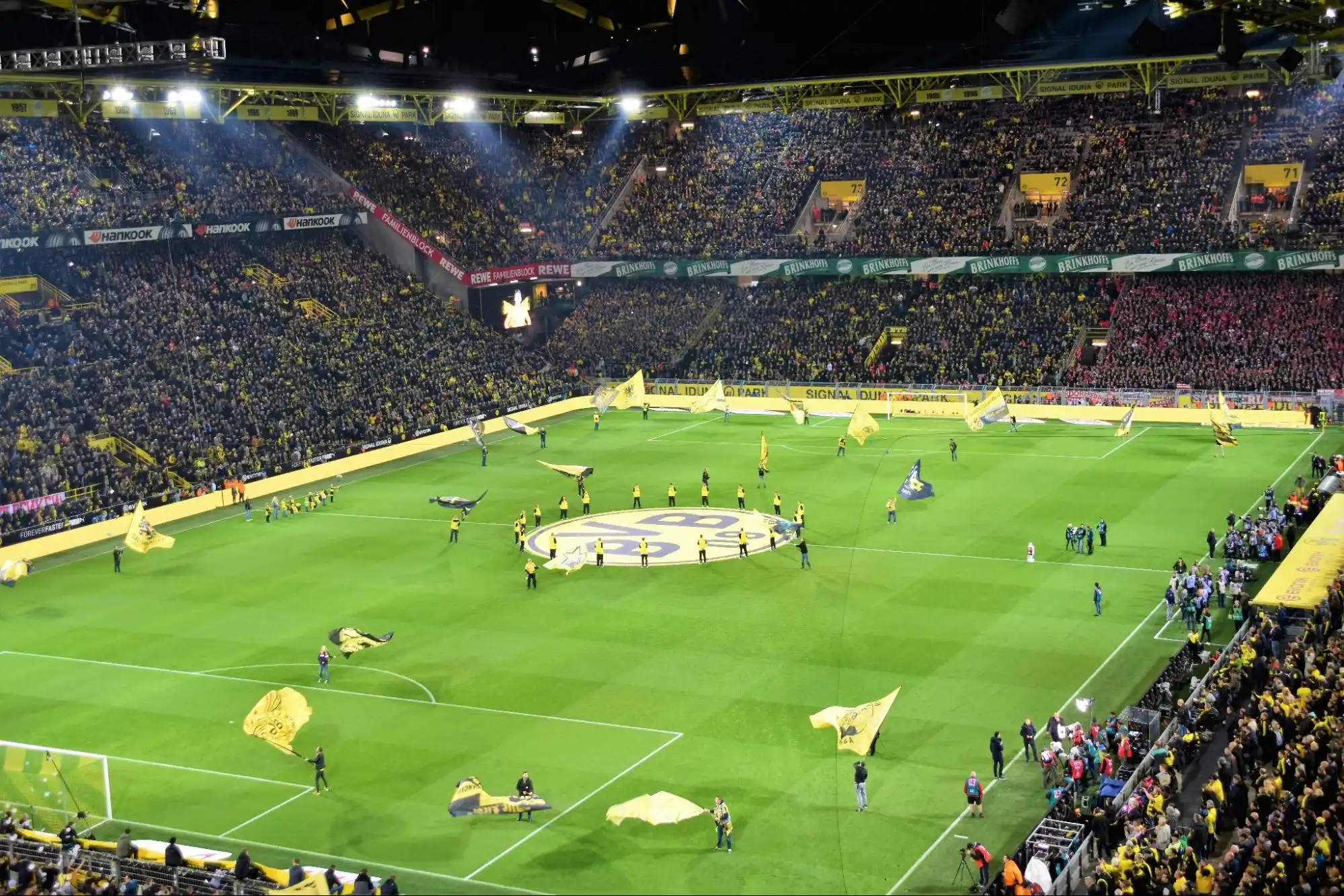
Even with a reduced capacity, the sense of scale at Signal Iduna Park is like almost nothing in world football. Contributing to the wonder of this venue is the south stand, Die Südtribüne, which is the largest free-standing grandstand in Europe, with a capacity of 25,000 for league games.
2. Munich Football Arena
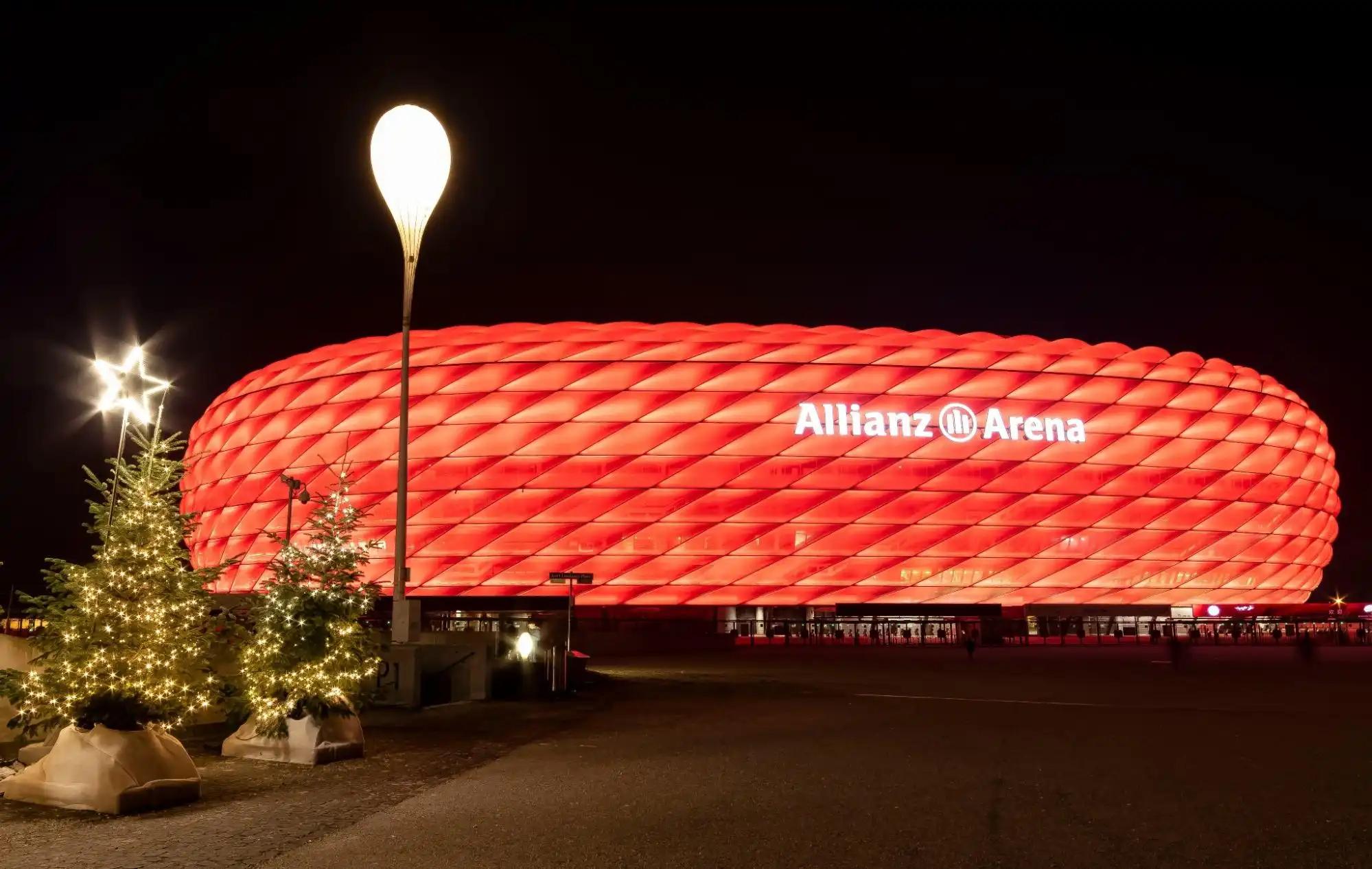
A polar opposite to Signal Iduna Park, the home of Dortmund’s great domestic rival was built in one phase for the 2006 World Cup. The Munich Football Arena looks great some 20 years later, with its luminous, colour-changing exterior and the wavelike contours of its upper tier.
3. Olympiastadion, Berlin
One of the great renovations in modern history turned a crumbling relic from Europe’s darkest period into a symbol for a 21st-century Germany. The Olympiastadion was reborn as a state-of-the-art multipurpose arena in 2004. During this work, the pitch was lowered by more than 2.5 metres and the lower tier was reconstructed at a new incline.
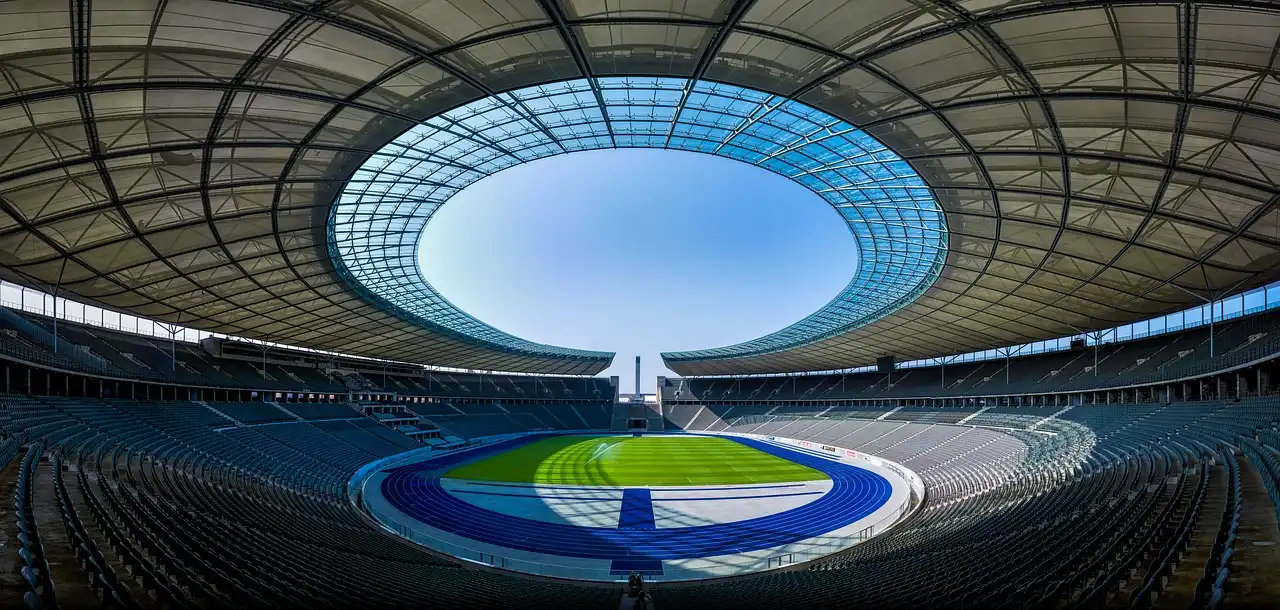
4. MHPArena, Stuttgart
Begun in the late-1920s, this is a stadium that has been reworked seven times. One recent improvement is the removal of the running track, always a good thing for a football stadium, while the distinctive fabric roof was added in the early 1990s. The MHPArena is a must-see Bundesliga venue for the Cannstatter Kurve, the raucous north shortside stand. This iconic part of the stadium has just been enlarged and is better than ever.
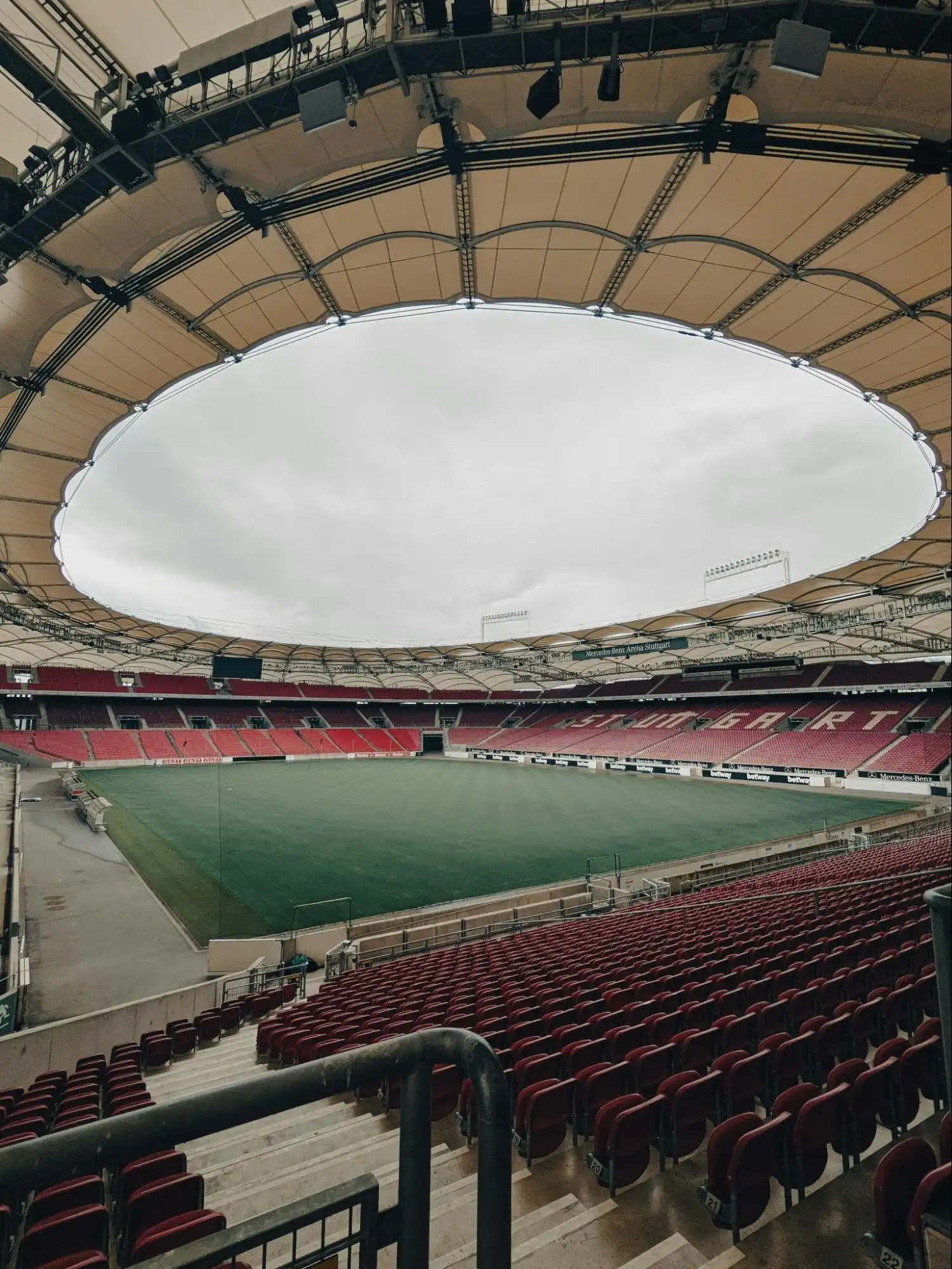
5. RheinEnergieStadion, Cologne
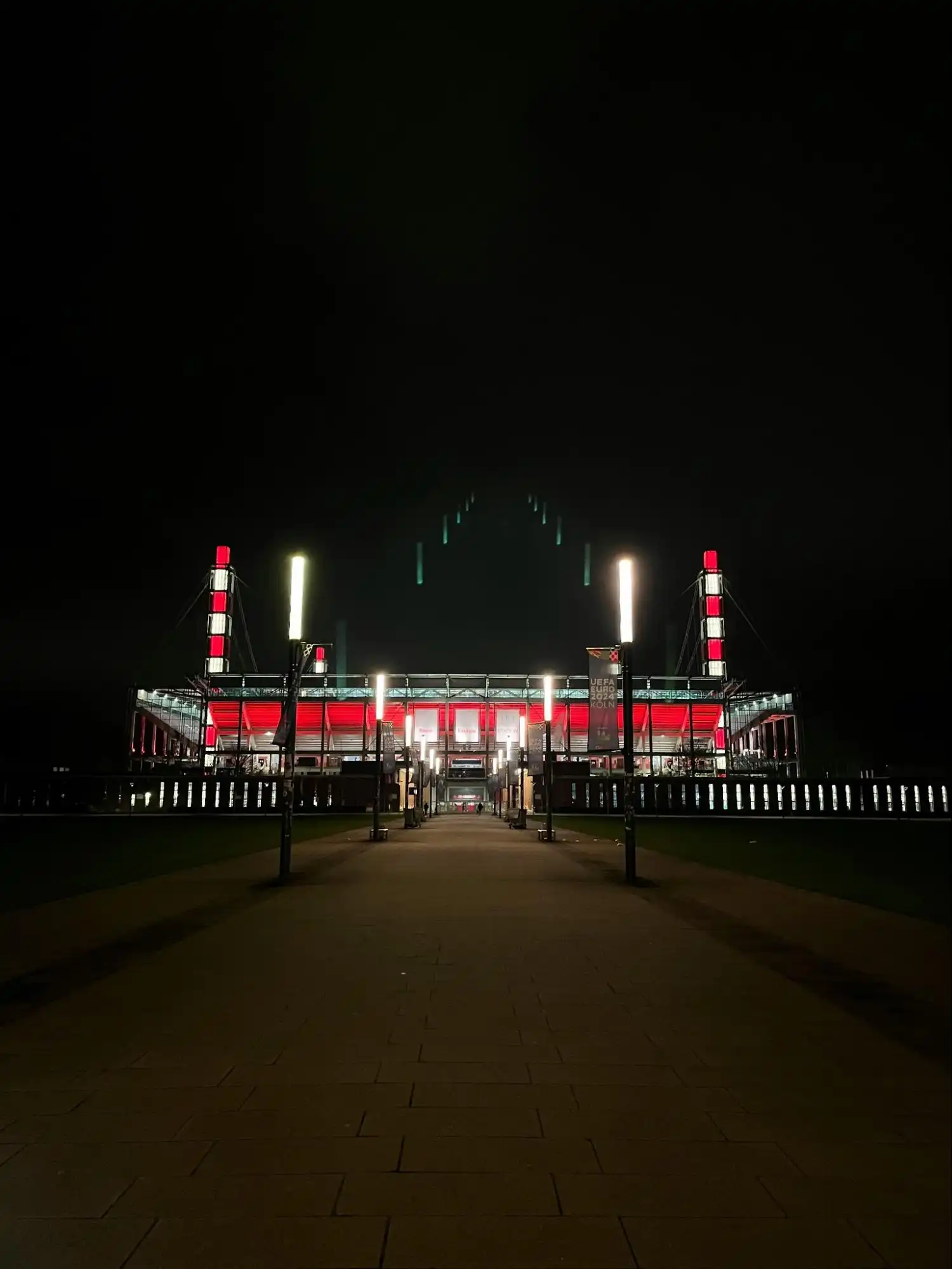
Also going back well before the Olympiastadion, Cologne’s RheinEnergieStadion was the largest sports stadium in Germany after completion in the early 1920s. There have been two rebuilds since then, and the current pared-down design dates from the mid-2000s. What gives this stadium its personality is the set of four pylons on each corner, fitted with LED lighting in 2016. Make sure to see this one at night.
6. Deutsche Bank Park, Frankfurt
When it was built in the early 1920s, this venue had earthwork embankments for stands. As a World Cup 2006 venue, Deutsche Bank Park was transformed into a modern, football-specific venue. A running track was removed and the stands, still embedded in earthen walls, were pulled much closer to the pitch. Most spectacular of all is the tent roof, designed like a wheel rim with spokes.
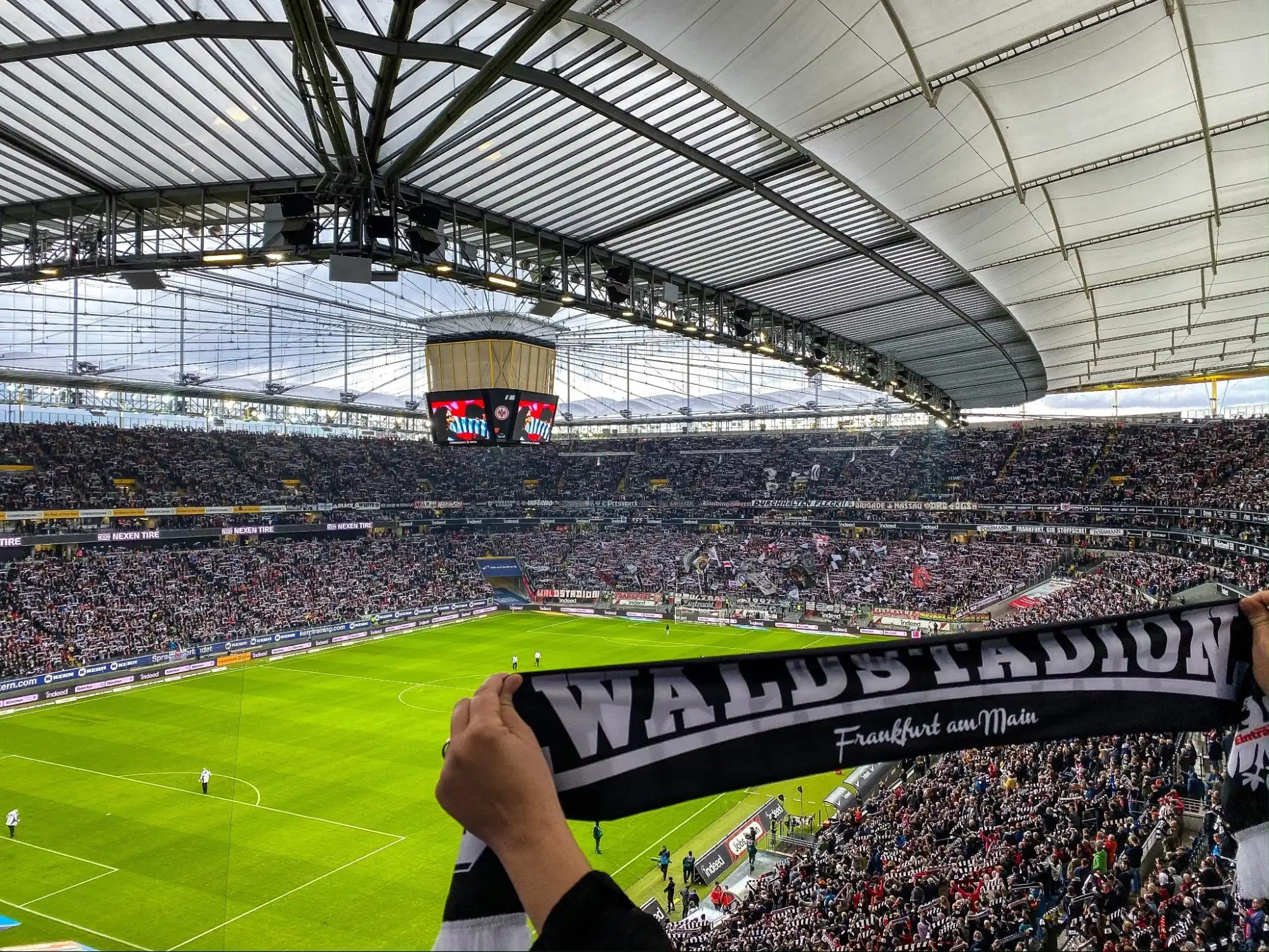
7. Veltins-Arena, Gelsenkirchen
One of many neat features of this stadium, opened in 2001, is the player’s tunnel. This is designed like a tunnel in a coal mine, as a nod to Gelsenkirchen’s industrial heritage in the Ruhr. Something for fans to enjoy is Europe’s largest video cube, suspended high above the pitch. This has a screen area of more than 300 square metres.
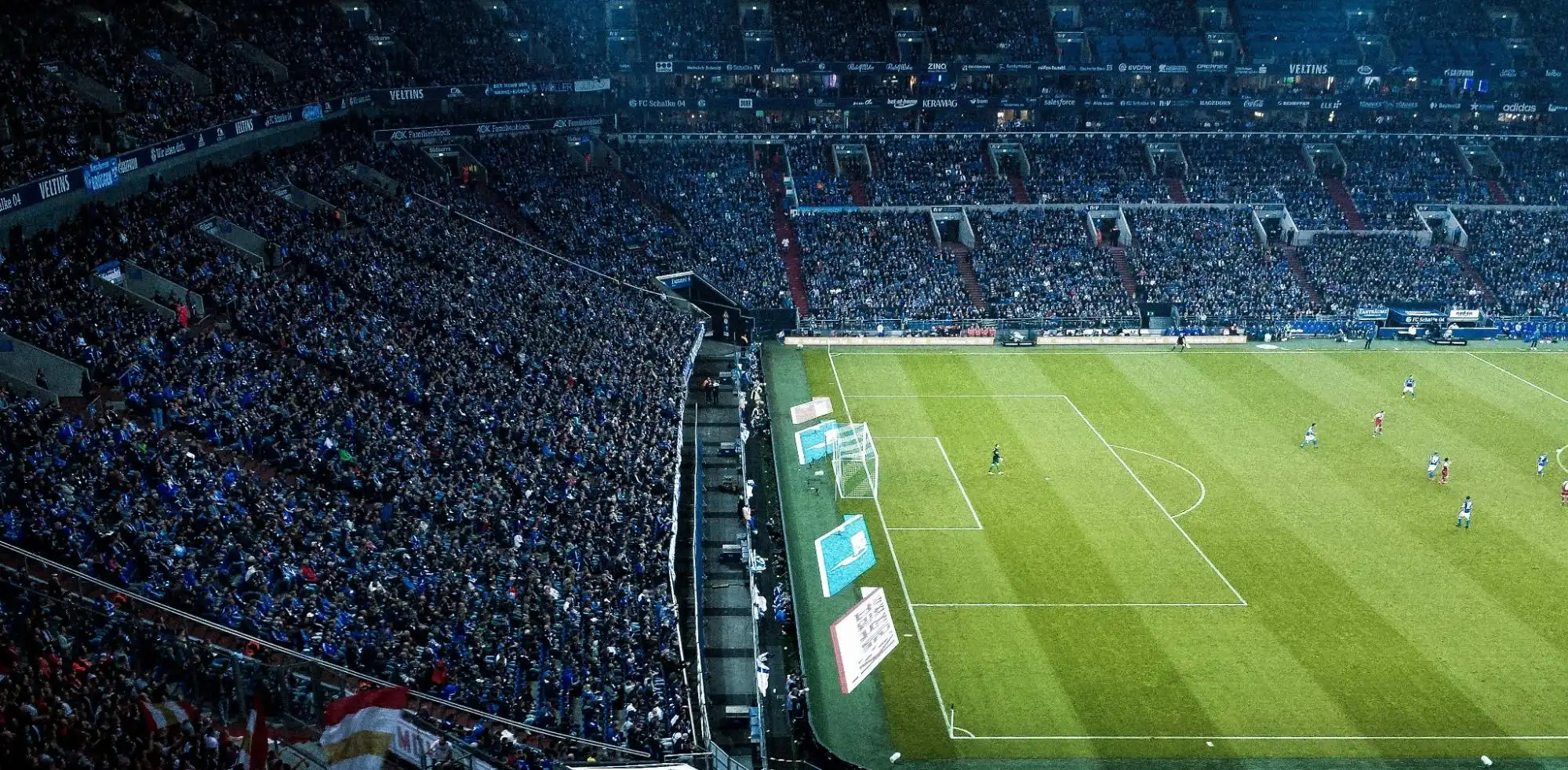
8. Merkur Spiel-Arena, Düsseldorf
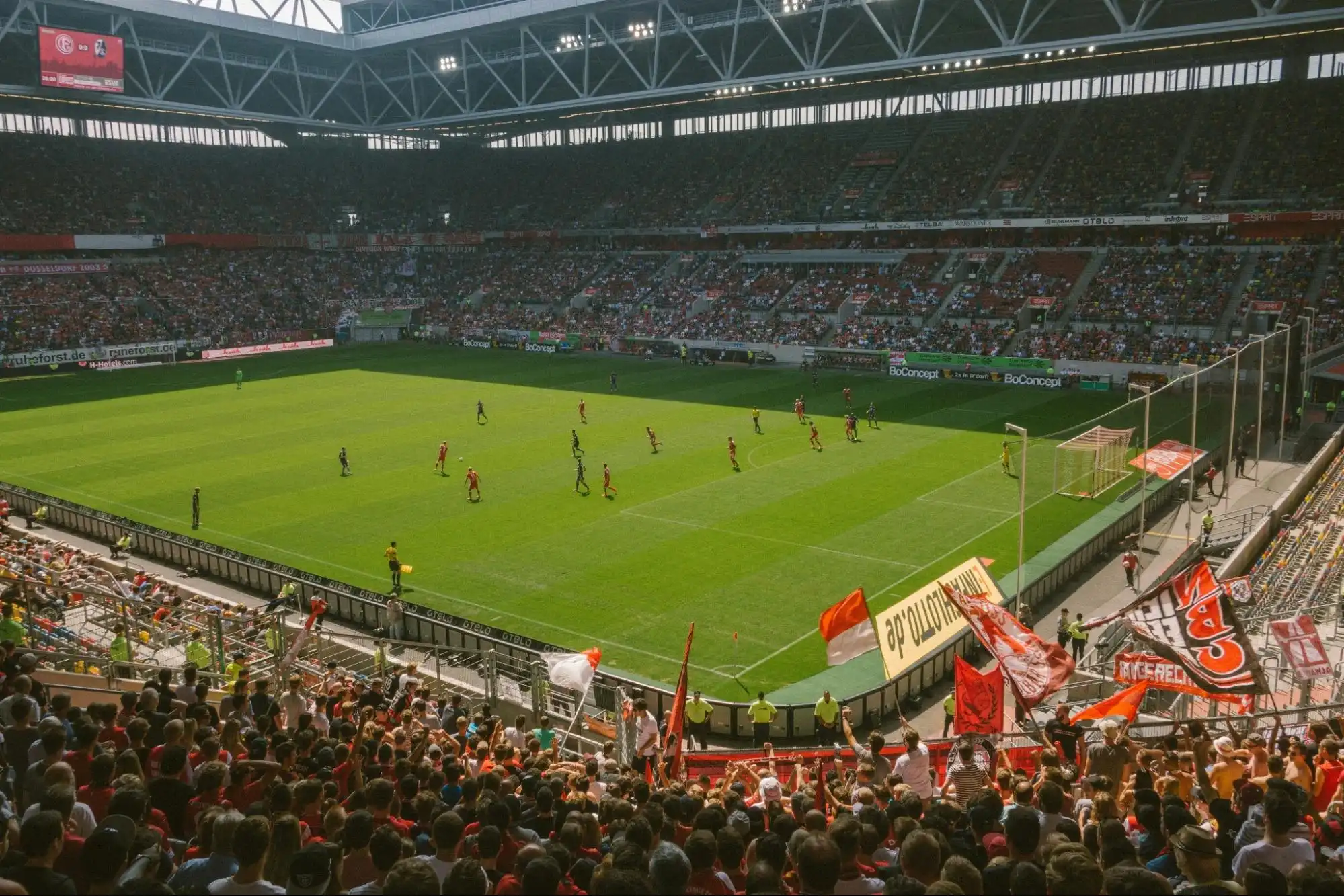
Impressive inside and out, this stadium by the Rhine has a satisfying, cube-like exterior and a retractable roof. Aside from that roof, which can maintain the interior temperature at 15°C, even on freezing days, the Merkur Spiel-Arena perhaps suffers from a lack of distinctive features.
9. Volksparkstadion, Hamburg

At the turn of the millennium one of the ugliest, least atmospheric grounds in Germany was reworked from a soulless bowl into a football cathedral. Even more impressive, that work continued while Hamburger SV continued to play their home games here. The Volksparkstadion has also undergone a big, $35m upgrade for Euro 2024, and is remarkable for its translucent roof, made up of 40 800-square-metre panels.
10. Red Bull Arena, Leipzig
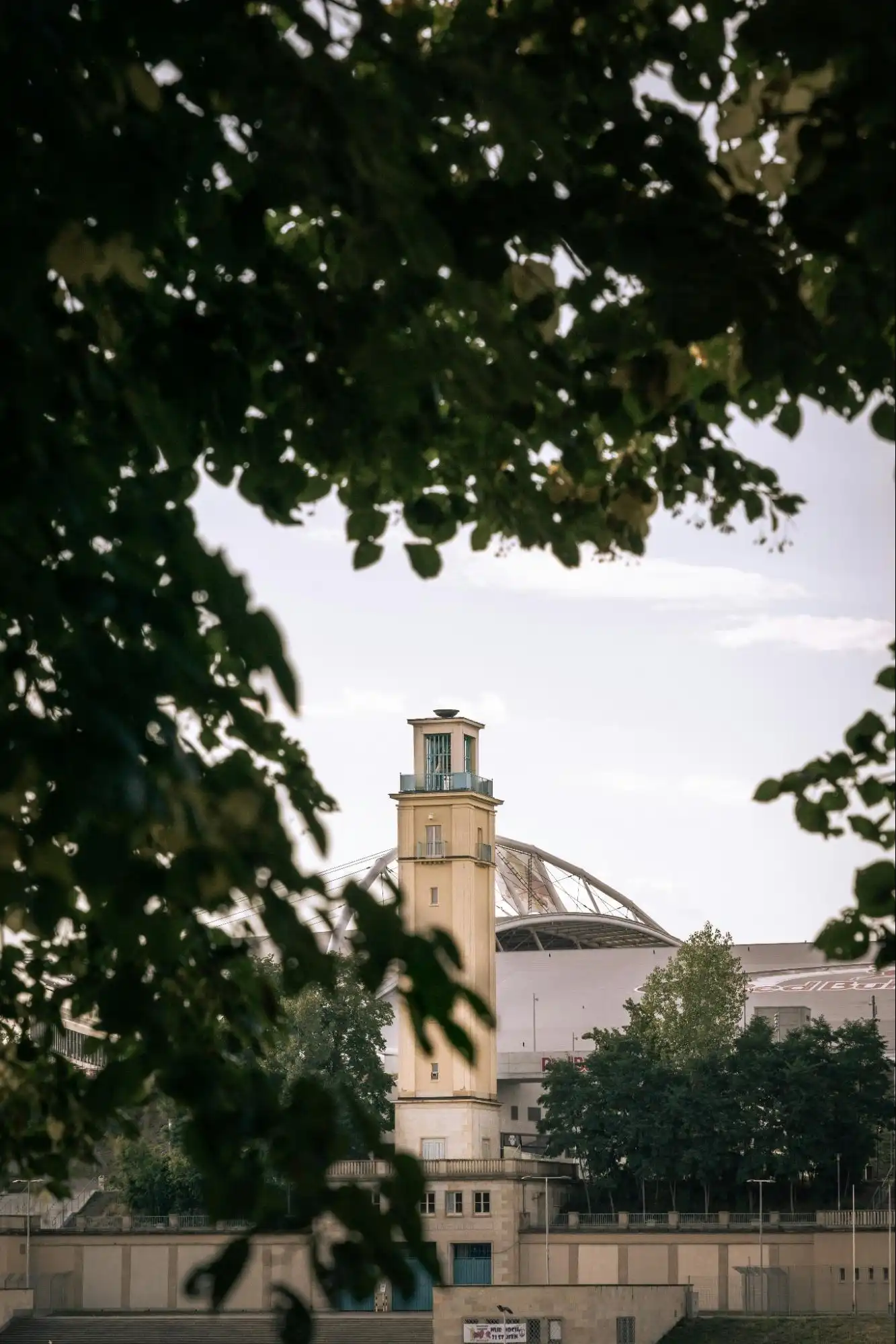
Like Frankfurt’s Deutsche Bank Park, the Red Bull Arena has risen from the earthen terracing of its predecessor. Bridges pass over these embankments as you enter the stadium, which was completed in 2004. Style-wise, this stadium is showing its age, though the pair of arched trusses that extend the length of the longside grandstands give it a lot of character.
Which Euro 2024 Stadium Has the Best Fan Experience?
In this section we’ll take into account factors like proximity to city centres, transport links, and in-stadium views. We’ll go alphabetically and calculate an average score out of 10.
1. Signal Iduna Park, Dortmund
Location
8/10 - At three kilometres from Dortmund’s main train station, you could walk to this stadium in half an hour if you don’t feel like using public transport
Public Transport
8/10 - In a few short minutes, bus 450 and the U-Bahn (metro) takes you to Westfalenhallen via lines U45 and U46, and from there it’s a brief walk to the stadium
Views
7/10 - Views are superb throughout, apart from in some of the corner seats, while the steeply banked tiers offer fantastic perspectives, even behind the goals
Additional Notes
- Easy access and exit
- Friendly stewards
2. Merkur Spiel-Arena, Düsseldorf
Location
8/10 - Some four kilometres north-west of Düsseldorf’s Altstadt
Public Transport
7/10 - Swift connections via the U-Bahn, directly outside the stadium and reaching the city centre in about 10 minutes, but prone to overcrowding
Views
9/10 - No complaints, in fact there may not be a bad seat in the house
Additional Notes
- Excellent organisation
- Superb facilities
3. Red Bull Arena, Leipzig
Location
8/10 - Right next-door to heart of Leipzig, and walkable in less than half an hour if you want to take your time
Public Transport
8/10 - Three tram lines from the main train station will whisk you to and from the stadium in a matter of minutes
Views
7/10 - Almost unbroken views throughout, except for a few spots where railings and fencing get in the way
Additional Notes
- A lot of stairs, and not ideal for people with mobility issues
4. Deutsche Bank Park, Frankfurt
Location
6/10 - Out by the airport in the south of the city, Deutsche Bank Park can be a bit of a slog to get to
Public Transport
8/10 - Good public transport options by S-Bahn (light railway), taking six minutes from the main train station (plus a 15-minute walk), along with a frequent tram service and two bus lines (61 and 80)
Views
9/10 - An exceptional modern arena, with excellent views from almost every seat
Additional Notes
- Immaculately clean
- A slight shortage of toilets
5. MHPArena, Stuttgart
Location
7/10 - One of the most centrally located stadiums at Euro 2024, about four kilometres from Stuttgart’s main railway station, across the Neckar River
Public Transport
8/10 - Two local S-Bahn (light railway) stations with three different lines help alleviate crowding before and after games
Views
7/10 - This is a stellar place to watch a football match, albeit with some restricted views in places where the repositioned stands mis-align with the old ones
Additional Notes
- Wheelchair spaces are open to the elements, and not ideal on hot or rainy days
6. Olympiastadion, Berlin
Location
7/10 - About eight kilometres west of Berlin’s Tiergarten
Public Transport
8/10 - U-Bahn (metro) and S-Bahn (light railway) stations right on the edge of the Olympiapark, with frequent trains reaching Potsdamer Platz in 20 minutes
Views
6/10 - Better on the longsides, while the east and west ends behind the goals can feel very distant from the pitch due to the running track
Additional Notes
- Entry systems are a little outdated
- Come for a guided tour on non-match days
7. Munich Football Arena
Location
4/10 - Ten kilometres north of Marienplatz, Munich’s central square
Public Transport
7/10 - Convenient connection via the S-Bahn (light railway), albeit with a long-ish walk
Views
9/10 - Possibly one of the best-designed football stadiums in the world, with clear views from almost every seat
Additional Notes
- Has Europe’s largest parking structure, with 9,800 spaces
8. Volksparkstadion, Hamburg
Location
6/10 - In the Altona district, about seven kilometres north-west of Hamburg’s central Jungfernstieg promenade
Public Transport
5/10 - A relatively long 20-minute journey awaits you on the S-Bahn (light railway), but you also have to catch a bus between the station and stadium, or put up with quite along walk
View
9/10 - The good news is that the Volksparkstadion is a fabulous modern venue, with excellent views from every section of the stadium
Additional Notes
- Everything works like clockwork
- Lots of food options around stadium
- Plenty of toilets
9. RheinEnergieStadion, Cologne
Location
5/10 - Approximately six kilometres west of Cologne Cathedral
Public Transport
6/10 - 25 minutes from the city centre and railway stations on the tram
Views
7/10 - Excellent, only with lower visibility at the far ends of each stand, which are perpendicular to the next one, while upper rows are a long way from the action
Additional Notes
- Another spotlessly clean stadium
- Showing signs of wear and tear
10. Veltins-Arena, Gelsenkirchen
Location
5/10 - The stadium is in a sprawling urban area, six kilometres north of the centre of Gelsenkirchen
Public Transport
4/10 - Options are surprisingly limited, with a tram system that can take a long time and functions poorly with big crowds
Views
8/10 - The positive is that is another world-class stadium when it comes to sightlines, with a steep gradient and no restricted views
Additional Notes
- Excellent facilities
- Plentiful parking
Which Euro 2024 Stadium Has the Best Sporting History?
Nothing gives a stadium a sense of personality than a history filled with great sporting moments, from legendary World Cup matches to athletic feats that are etched in our collective consciousness.
1. Olympiastadion, Berlin
It doesn’t get much bigger than the venue for the 1936 Olympics, where Jesse Owens won four gold medals, and in the process exploding a regime’s racist myth for all the world to see. Added to that legacy are matches from the 1974 and 2006 World Cups, the 2011 Women’s World Cup opener, and the 2015 Champions League Final, won by Barcelona.
2. MHPArena, Stuttgart
A stadium with real football pedigree, the MHPArena has hosted matches from the 1974 and 2006 World Cups, as well as Euro 1988. Germany’s first post-WWII match took place right here in 1950, as did the first game to feature players from West and East Germany following Reunification in 1990.
3. Deutsche Bank Park, Frankfurt
Euro 2024 is the latest in a long line of important events hosted by this stadium. This includes five games at the 1974 World Cup, two at Euro 1988, four at the 2005 Confederations Cup, five at the 2006 World Cup, and four at the 2011 Women’s World Cup, including Japan’s momentous victory over the USA in the final.
4. Signal Iduna Park, Dortmund
A fitting venue for big games, Signal Iduna Park has of course witnessed plenty of European action down the years, including their successful campaign in 1996-97. There were also four games here during the 1974 World Cup, and then six in 2006, one being the famous semi-final, when Italy beat Germany 2-0 on their way to the trophy.
5. Munich Football Arena
As soon as this stadium was ready, it hosted six matches at the 2006 World Cup, including the semi-final between Portugal and France. The Munich Football Arena also hosted the 2012 Champions League Final—won in dramatic fashion by Chelsea—as well as four matches at Euro 2020. Not to forget, FC Bayern’s countless Champions League clashes over the years.
6. Volksparkstadion, Hamburg
Big games to take place in Hamburg include the 1974 World Cup game between East Germany and West Germany, and the contentious Euro 1988 semi-final, when the Netherlands beat West Germany on the way to their Championship win. There were also five matches at the 2006 World Cup, including Italy’s win against Ukraine in the quarter-final.
7. RheinEnergieStadion, Cologne
This historic city missed out as a World Cup venue in 1974, but hosted five early games in the 2006 edition. England fans may remember Joe Cole’s spectacular goal in the 2-2 draw against Sweden.
8. Red Bull Arena, Leipzig
Five matches, including a knockout game between Argentina and Mexico, took place here at the World Cup in 2006. That’s the extent of the stadium’s international sporting heritage, although host club Red Bull Leipzig have become a regular in the Champions League since the late 2010s.
9. Veltins-Arena, Gelsenkirchen
It was here that England fell to Portugal in the quarter-finals of the 2006 World Cup, one of five games hosted by the Veltins-Arena in that tournament. Fans of beautiful football may remember Esteban Cambiasso’s strike against Serbia and Montenegro, considered one of the great World Cup team goals.
10. Merkur Spiel-Arena, Düsseldorf
This stadium doubles as a live performance venue, and even hosted the Eurovision Song Contest in 2011. In terms of sporting history, the Merkur Spiel-Arena was unused for the World Cup in 2006, while its tenant, Fortuna Düsseldorf plays mostly in Germany’s second tier.
Ranking the Euro 2024 Stadium Host Cities
In this category we’re ranking the stadium’s city for visitors. While you can expect a warm welcome wherever you go in Germany, it’s only natural that certain places will rank higher for touristy factors like history, culture, and nightlife.
1. Olympiastadion, Berlin
Frankly, there’s no beating Berlin as a host city, with its thought-provoking history, magnificent landmarks, endless shopping and some of the wildest nightlife on the planet.
2. Volksparkstadion, Hamburg
For nightlife, few places in the world can compete with Hamburg, a port city, home to the Reeperbahn and its many bars, clubs and concert venues.
3. Merkur Spiel-Arena, Düsseldorf
Another host city that knows how to party, Düsseldorf may have the most exciting historic centre in Germany, wedged against the bank of the Rhine.
4. RheinEnergieStadion, Cologne
Stylish, lively, full of students and loaded with history, Cologne is commanded by the twin spires of one of Europe’s great cathedrals.
5. Munich Football Arena
Famed for Oktoberfest, which actually begins in September, Munich has a multifaceted appeal, from the splendid Residenz palace to the headquarters of BMW.
6. Deutsche Bank Park, Frankfurt
It’s a travesty that Germany’s futuristic financial powerhouse, on a tributary of the Rhine, should be so low on this list. But such is the competition.
7. MHPArena, Stuttgart
Two more iconic automobile brands, Mercedes-Benz and Porsche, are headquartered in this wine-growing city on the Neckar River in south-west Germany.
8. Red Bull Arena, Leipzig
In Eastern Germany, the country’s eight-largest city is relatively low-key, best known for its classical music heritage.
9. Signal Iduna Park, Dortmund
While this former industrial city—Germany’s ninth largest— has a lot going for it, it’s fair to say that the world-famous football stadium is the biggest local attraction.
10. Veltins-Arena, Gelsenkirchen
Also at the very heart of the Ruhr area, Gelsenkirchen has a few attractions if you want to get to grips with Germany’s industrial powerhouse.
The Verdict: So Which is the Best Euro 2024 Stadium?
Here’s our final ranking for the Euro 2024 stadiums, taken from an average position in each of the five categories above.
1. Olympiastadion, Berlin
2. Signal Iduna Park, Dortmund
3. Munich Football Arena
4. MHPArena, Stuttgart
5. Deutsche Bank Park, Frankfurt
6. Volksparkstadion, Hamburg
7. Merkur Spiel-Arena, Düsseldorf
8. RheinEnergieStadion, Cologne
9. Veltins-Arena, Gelsenkirchen
10. Red Bull Arena, Leipzig
What Have We Learned about Euro 2024’s Venues?
Maybe it’s no coincidence that the Olympiastadion, the venue for the final, came out on top, ahead of the two semi-final stadiums, Signal Iduna Park and the Munich Football Arena.
As we mentioned up top, there are no losers in this competition, and the difference between 1 and 10 isn’t massive. Wherever you go, and whatever the outcome of the match, you’re sure to have fun, but it’s worth staying ahead of any infrastructure problems.
Buying Tickets for Euro 2024
As we head towards the knockout stages, things are getting exciting at Euro 2024. If you’re feeling inspired, you can still buy Euro 2024 tickets.
Ticket-Compare.com lists tickets from a range of secondary marketplaces, offering 100% authentic tickets from trusted vendors.